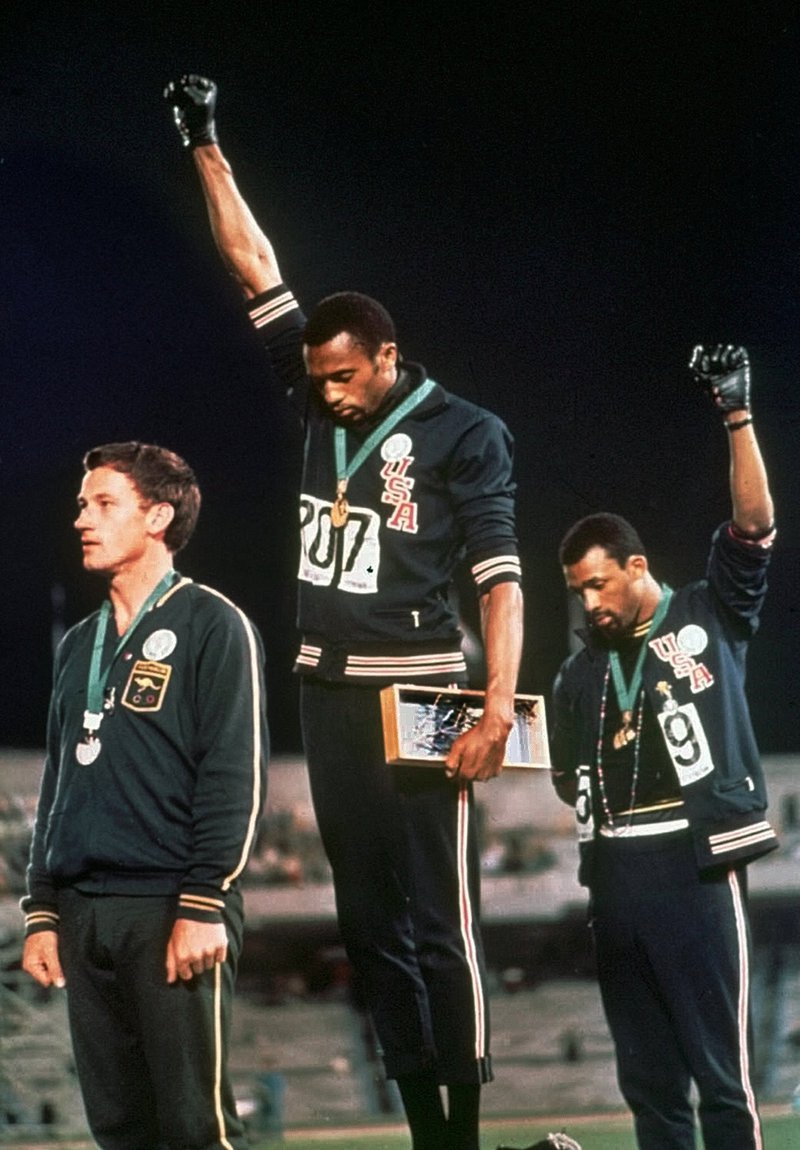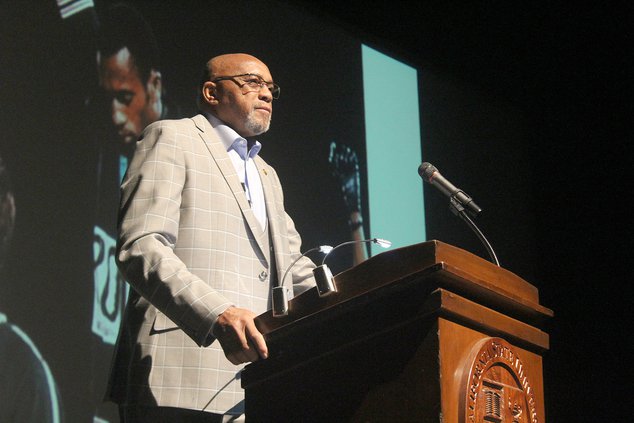“Your life begins to end the day you become silent about things that matter.”
That was the message renowned activist and Olympian Dr. Tommie Smith had for a standing-room-only crowd at Stanislaus State on Friday, where he gave a passionate speech about the importance of giving voice to critical issues.
Smith is recognized worldwide for his iconic demonstration at the 1968 Mexico City Olympics when he raised his glove-covered fist after accepting the gold medal for the 200-meter dash. The silent gesture was intended to raise awareness about racial inequality. Jim Crow laws enforcing segregation were no longer enforced in America, but Smith said he saw little difference in the attitudes of many. His controversial protest paved the way for future athlete activists, including one that grew up in the city where he spoke last week: Turlock’s Colin Kaepernick.
Though Smith’s speech Friday night was geared toward the future generation of athletes in the audience who may someday want to have their voices heard, he took time ahead of his appearance to speak with the Journal about the city’s one-time hero and the similarities the pair share.

“It’s now 50 years later and we’re still fighting for the things we fought for back in the day,” Smith said. “Colin used the opportunity he had to testify what his beliefs were, and back in ’68 it was basically the same type of incident on the same world stage. We were both commenting on the needs for social change.”
Kaepernick, a Pitman High School graduate and former quarterback for the San Francisco 49ers, sent shockwaves throughout the nation when he began kneeling during the national anthem in 2016. His own silent gesture was meant to call attention to police brutality against people of color, but outrage followed as Americans took the act as an attack against the flag, nation and military.
Smith’s protest in 1968 was also viewed as disrespect toward the flag, and as a result he was expelled from the Olympic Games that year. Similarly, Kaepernick hasn’t played in the NFL since 2016 — an outcome that many believe is an intentional act of “blackballing” by the league.
“It was the scene that disturbed most of the people, not the thought,” Smith said of both his and Kaepernick’s protests. “Just like in ’68, people took it wrong and he’s been trying to prove it different ever since.”
The significance of a silent protest is that they often are the result of a lengthy thought process, Smith said.
“There are a lot of athletes now beginning to think and not just bounce a ball…it’s a thought process now about their responsibility to be a part of the change in a country which is in peril at this time,” Smith said. “I always questioned myself, not just after my protest but even when I was walking up to the victory stand. I had to do it to prove a point, even though my life was on the line.”
Smith paved the way for not only Kaepernick, but other athletes like LeBron James and Serena Williams to use their voice in order to bring about change. His protest and Kaepernick’s stand apart, however, because they risked their careers and livelihood to take a stand as the world took notice.

“There are a lot of speakers who want to do something, and all they do is throw a lot of words in the middle of the street and hope that somebody will understand. My life was thrown in the street and I came out alive,” Smith said. “Colin stepped out on a tight rope without a safety net…we had the same direction and same idea but using different platforms. What Colin Kaepernick and I did can’t be done again. We were the first to do what we did to make a point, and there was no other way that we knew how to do it but by using our lives.”
Smith said he’s talked to Kaepernick on several occasions, and they email each other here and there. Kaepernick even sent him a pair of his limited-edition Nike shoes — a bond that serves as a testament to the two activists’ commonalities.
It was like history repeated itself when Kaepernick took a knee, Smith added, and he admitted that due to the backlash he himself received in 1968, he was worried for the quarterback when he first protested. But, just as his own message was eventually received by the public (there’s a statue of Smith at his alma mater San Jose State University), Smith believes history will look kindly upon Kaepernick.
“He’s from Turlock so we believe that he’s a very good kid with a good idea — he just got caught up in others’ ideas of how wrong he was. I don’t think he was wrong,” Smith said. “He sacrificed to give an understanding to others…there is redemption in sacrifice if that sacrifice meant the chance of helping man do a better job at practicing humanity.”





